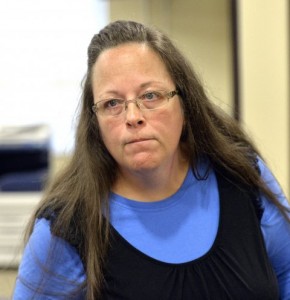Religious Exceptionalism and the Law: Kim Davis’s Marriage Equality Protest
UPDATE: Kim Davis was ordered to be released from jail today, September 8, 2015.
On Thursday, September 3, Kim Davis, the Kentucky clerk who refused to issue marriage licenses due to her religious condemnation of same-sex marriage, was taken into custody by federal marshals. After defying numerous court orders in protest, Davis was found in contempt of court and sentenced to jail until she agrees to perform her duties as clerk of Rowan County.
In a statement released on September 1, Davis cited “religious conscience” as the reason why she discriminated against same-sex couples seeking marriage licenses, failed to do her job, and willingly broke the law. Mathew Staver, founder and chairman of Liberty Counsel, which represents Davis, issued a statement, claiming that “Everyone is stunned at this development. Kim Davis is being treated as a criminal because she cannot violate her conscience. While she may be behind bars for now, Kim Davis is a free woman. Her conscience remains unshackled.”
When is it acceptable for religious belief to undermine civil rights protections? The answer may be never, but Davis reminds us: “Our history is filled with accommodations for people’s religious freedom and conscience.” According to the US Constitution, religious freedom does not equate to religious entitlement. While the First Amendment protects the free exercise of religion, the Establishment Clause prohibits the government from establishing an official religion and forbids religious favoritism, which is why Davis’s actions are particularly egregious.
As a government employee, a disregard of non-discriminatory government policy based on religious faith is negligent and an abuse of power. Davis used her authority to oppress the people she was elected to serve and to enforce her standards above law—all while continuing to collect compensation from the Commonwealth of Kentucky. The religious exceptionalism reflected in her argument is exceptionally troubling:
I never imagined a day like this would come, where I would be asked to violate a central teaching of Scripture and of Jesus Himself regarding marriage. To issue a marriage license which conflicts with God’s definition of marriage, with my name affixed to the certificate, would violate my conscience.
Although Davis has the right to comport her religious standards outside of work, as a civil servant, she has no moral or constitutional right to deny services to members of the public who are rightly entitled to them. While representing the state, a civil servant cannot (and should not) claim that religious conscience takes priority over constitutionally established civil rights—and thankfully on Thursday the court once again reaffirmed this assertion.
The New York Times reports that Davis will be released once she agrees to issue marriage licenses. Judge David L. Bunning of the Federal District Court determined that a mere fine was not considered sufficient punishment to induce her compliance. “The court cannot condone the willful disobedience of its lawfully issued order,” Judge Bunning said. “Her good-faith belief is simply not a viable defense.” While progress can still be made to truly remove religious exceptionalism from the government services, the Supreme Court’s Obergefell v. Hodges decision, and its lawful fortification, are exceptionally promising. Kim Davis’s future as a country clerk, not so much.

